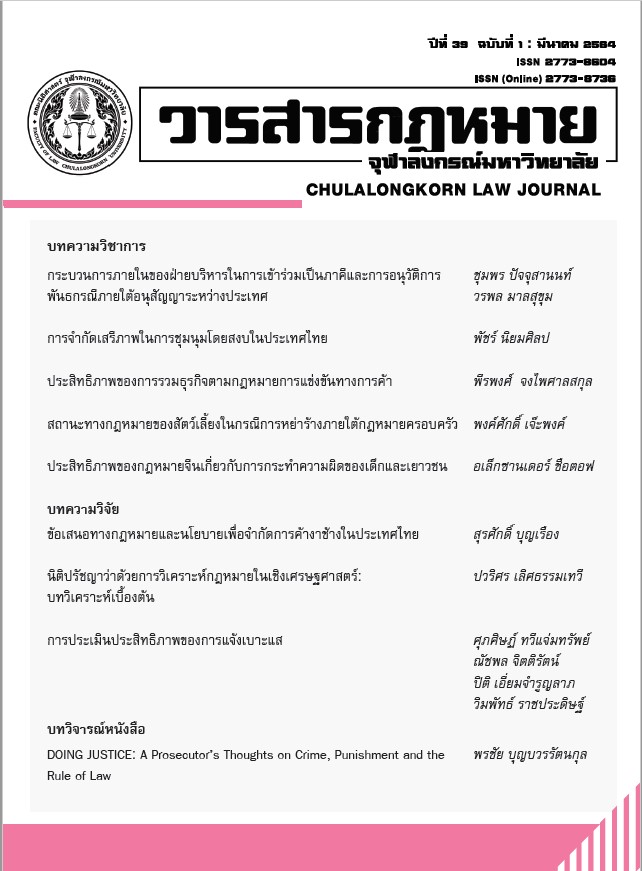การประเมินประสิทธิภาพของการแจ้งเบาะแส
Main Article Content
บทคัดย่อ
คอร์รัปชั่น โดยให้บุคคลในองค์กรทั้งในภาครัฐและเอกชนที่พบเห็นการทุจริตออกมาให้เบาะแสแก่หน่วยงาน
ที่เกี่ยวข้อง เพื่อนำเบาะแสเหล่านั้นไปดำเนินการต่อไปให้เกิดธรรมาภิบาลและการบริหารจัดการที่ดีขององค์กร
ในส่วนของภาคเอกชนนั้น การแจ้งเบาะแสเป็นมาตรการที่สะท้อนให้เห็นหลักความรับผิดชอบต่อสังคม (Corporate Social Responsibility : CSR) ซึ่งแสดงถึงความโปร่งใสขององค์กร ในปัจจุบันประเทศไทยยังไม่มีพระราช
บัญญัติเฉพาะเกี่ยวกับการแจ้งเบาะแส แต่ปรากฏบทบัญญัติเกี่ยวกับการแจ้งเบาะแสแทรกซึมอยู่ในพระราชบัญญัติ
ต่าง ๆ การแจ้งเบาะแสในประเทศไทยจึงมีความแตกต่างกันทั้งในเรื่องเงื่อนไขของการแจ้งเบาะแส กระบวนการ
จัดการกับเบาะแส การคุ้มครองผู้แจ้งเบาะแส มาตรการเยียวยาผู้แจ้งเบาะแส ตลอดจนมาตรการส่งเสริมการแจ้ง
เบาะแส สถานการณ์ดังกล่าวสะท้อนให้เห็นว่าระบบการแจ้งเบาะแสในประเทศไทยยังไม่มีประสิทธิภาพเท่าที่ควร
จึงจำาเป็นต้องศึกษาหาแนวทางเสริมสร้างประสิทธิภาพดังกล่าวอย่างเป็นรูปธรรม ในงานศึกษานี้พบว่า เกณฑ์
ประเมินประสิทธิภาพของการแจ้งเบาะแสอาจแบ่งออกเป็น 4 ประการ ได้แก่ แรงจูงใจในการแจ้งเบาะแส
ความครอบคลุมของการแจ้งเบาะแส กระบวนการในการแจ้งเบาะแส และความน่าเชื่อถือของข้อมูล โดยที่
“แรงจูงใจในการแจ้งเบาะแส” เป็นปัจจัยที่สำคัญที่สุดต่อประสิทธิภาพของการแจ้งเบาะแส ดังนี้ การตรากฎหมาย
เกี่ยวกับการแจ้งเบาะแสของประเทศไทยจึงต้องประกอบไปด้วยหลักการคุ้มครองผู้แจ้งเบาะแส การเยียวยาผู้แจ้ง
เบาะแสอย่างเป็นรูปธรรม และการนำมาตรการการให้เงินรางวัลมาใช้บังคับ
Article Details
ลิขสิทธิ์และเนื้อหาในเว็บไซต์ของวารสารกฎหมาย (รวมถึง โดยไม่จำกัดเฉพาะ เนื้อหา รหัสคอมพิวเตอร์ งานศิลป์ ภาพถ่าย รูปภาพ ดนตรีกรรม โสตทัศนวัสดุ) เป็นกรรมสิทธิ์ของวารสารกฎหมาย และผู้ได้รับการโอนสิทธิทุกราย
1. วารสารกฎหมาย ให้อนุญาตให้คุณใช้สิทธิอันไม่เฉพาะเจาะจงที่สามารถถูกถอนเมื่อใดก็ได้ โดยไม่มีค่าใช้จ่าย ในการ
- เยี่ยมชมเว็บไซต์และเอกสารในเว็บไซต์นี้ จากคอมพิวเตอร์หรือเครื่องมือสื่อสารผ่านเว็บบราวเซอร์
- คัดลอกและจัดเก็บเว็บไซต์และเอกสารในเว็บไซต์นี้บนลงคอมพิวเตอร์ของคุณผ่านระบบความจำ cache
- สั่งพิมพ์เอกสารจากเว็บไซต์นี้สำหรับการใช้ส่วนตัวของคุณ
- ผลงานที่ได้รับการตีพิมพ์โดยวารสารกฎหมาย จุฬาลงกรณ์มหาวิทยาลัย ถูกคุ้มครองภายใต้ Creative Commons Attribution 4.0 International License ซึ่งอนุญาตให้ทุกคนสามารถคัดลอก แจกจ่าย ดัดแปลง ส่งต่อ ผลงานได้ ก็ต่อเมื่อผลงานและแหล่งข้อมูลได้รับการอ้างอิงอย่างเหมาะสม
2. วารสารกฎหมาย จุฬาลงกรณ์มหาวิทยาลัย สงวนสิทธิ์ไม่อนุญาตให้คุณใช้สิทธิอื่นใดที่เกี่ยวข้องกับเว็บไซต์และเอกสารบนเว็บไซต์นี้ เช่น การคัดลอก ดัดแปลง เปลี่ยนแปลง ส่งต่อ ตีพิมพ์ แจกจ่าย เผยแพร่ จัดแสดงในที่สาธารณะ ไม่ว่าจะในรูปแบบใดก็ตาม ซึ่งเว็บไซต์หรือเอกสารบนเว็บไซต์ โดยไม่อ้างอิงถึงแหล่งข้อมูลหรือโดยไม่ได้รับอนุญาตเป็นลายลักษณ์อักษรจากวารสารกฎหมาย จุฬาลงกรณ์มหาวิทยาลัย
3. คุณอาจขออนุญาตที่จะใช้เอกสารอันมีลิขสิทธิ์บนเว็บไซต์นี้โดยการเขียนอีเมลล์มายัง journal@law.chula.ac.th
4. วารสารกฎหมาย จุฬาลงกรณ์มหาวิทยาลัย เข้มงวดกับการคุ้มครองลิขสิทธิ์อย่างมาก หากวารสารกฎหมาย จุฬาลงกรณ์มหาวิทยาลัยพบว่าคุณได้ใช้เอกสารอันมีลิขสิทธิ์บนเว็บไซต์นี้โดยไม่ถูกต้องตามการอนุญาตให้ใช้สิทธิ ดังที่กล่าวไปข้างต้น วารสารกฎหมาย จุฬาลงกรณ์มหาวิทยาลัยอาจดำเนินคดีตามกฎหมายต่อคุณได้ เพื่อเรียกร้องค่าเสียหายที่เป็นตัวเงินและคำขอชั่วคราวให้คุณหยุดการใช้เอกสารดังกล่าว ทั้งนี้ คุณอาจถูกสั่งให้ชดใช้ค่าใช้จ่ายใดๆ ที่เกี่ยวข้องกับการดำเนินการตามกฎหมายนี้
หากคุณพบเห็นการใช้เอกสารอันมีลิขสิทธิ์ของวารสารกฎหมาย จุฬาลงกรณ์มหาวิทยาลัย ที่ขัดหรืออาจขัดต่อการอนุญาตให้ใช้สิทธิดังที่ได้กล่าวไปข้างต้น โดยเชื่อว่าได้ละเมิดลิขสิทธิ์ของคุณหรือของผู้อื่น สามารถร้องเรียนมาได้ที่ journal@law.chula.ac.th


